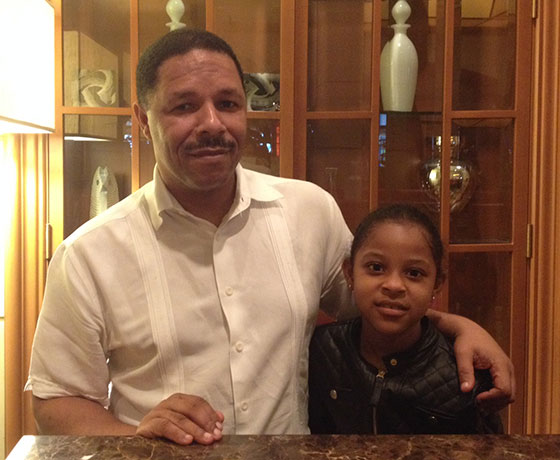Chicago Speaks: Comorian, as Spoken by Charif Hachim, Honorary Consul General of Comoros in Chicago (original) (raw)
Chicago Speaks Tue Sep 23 2014
 As a global city, Chicago is home to many languages besides English. Chicago Speaks profiles speakers of these languages, and shares some of their personal stories along the way.
As a global city, Chicago is home to many languages besides English. Chicago Speaks profiles speakers of these languages, and shares some of their personal stories along the way.
Charif Hachim's home, where he lives with his wife and three children, might be the only one in Chicago where people speak Comorian. Comorian? It's the language of Comoros, a group of islands located in the channel between Mozambique and Madagascar.
Hachim knows of only one other local Comorian family, and they live in the suburbs. He would know best. He has lived in Chicago for more than two decades and since last year has been the honorary consul general of Comoros in Chicago.
He first visited in 1989, as a business student doing an internship abroad, and "just fell in love with the city." So he decided to move here after finishing his studies in France. France? It's a country with a long and complicated history in Comoros, which it counted among its colonies until 1975. Hachim's life — and his languages — are intertwined with that history.
A French Interlude
When he was born in 1966, Comoros had been subject to French rule for roughly a century. Soon, though — on July 6, 1975 — the country became independent. Within weeks a coup deposed the president, Ahmed Abdallah, who returned to power after another coup in 1978.
During that turbulent period, Hachim explains, "the educational system in the Comoros was in disarray and those who could send their kids outside of the country were doing so."
Hachim's parents sent him to France, where he would spend the next decade.
"That was a natural route to take, anyway," he says. "Anybody who was going to come back to Comoros to work in administration had to go to France. That's where our first doctors came from, our first engineers. All of our presidents... studied over there."
At his boarding school he spoke only French, quickly picking up the local accent. "Back in those days I spoke French just like French people," he says. But every weekend he spoke Comorian at the home of an uncle who also lived in France. Without those weekends, Hachim says, "I would probably not be speaking Comorian today... It would have gone."
Languages of Comoros
France wasn't the first place where he divided his time between languages. Back home he'd spent mornings attending school in French and afternoons at a Quranic school. (Most Comorians are Muslim.) At home he spoke Comorian, the native language of most of the country's 750,000-plus residents.
A Bantu language, Comorian is so closely related to Swahili that some people have erroneously considered it a Swahili dialect. In fact, Comorian has its own distinct dialects, one for each of the main islands in the Comorian archipelago.
Another Country
The number of islands Comoros comprises depends on who you ask. Comoros puts the number at four: Mwali, Nzwani, Mayotte and Ngazidja, where Hachim grew up in the capital city of Moroni.
France puts it at three: While a majority of Comorians favored breaking away from France in the 1974 vote that led to independence, most people in Mayotte wanted to remain under French rule. So even after Comoros declared all four islands independent in 1975, France continued administering Mayotte.
In 2009, Mayotte residents voted to strengthen the tie by making the island a French department, and today they are full-fledged French citizens. But Comoros continues to contest Mayotte's status.
"To the French, it's just part of France, but to us, it's a colony," Hachim says, explaining the Comorian point of view. "We look like them, we speak the same language, we have the same religion, we have the same cultural background, we have families there. But to go there, I need a visa... It's very political."

Honorary Consul General of Comoros Charif Hachim and his daughter Rookeeya. Photo by Megan Marz.
Speaking of politics in Comoros, Hachim mentions the upcoming presidential elections there, wondering who will lead the country next. His 7-year-old daughter, seated beside him, offers her prediction: "It's going to be you!"
Hachim laughs. "Yeah, maybe, why not?" So he might someday go home and get involved in politics? "Why not? It's a small country where everything is possible."
